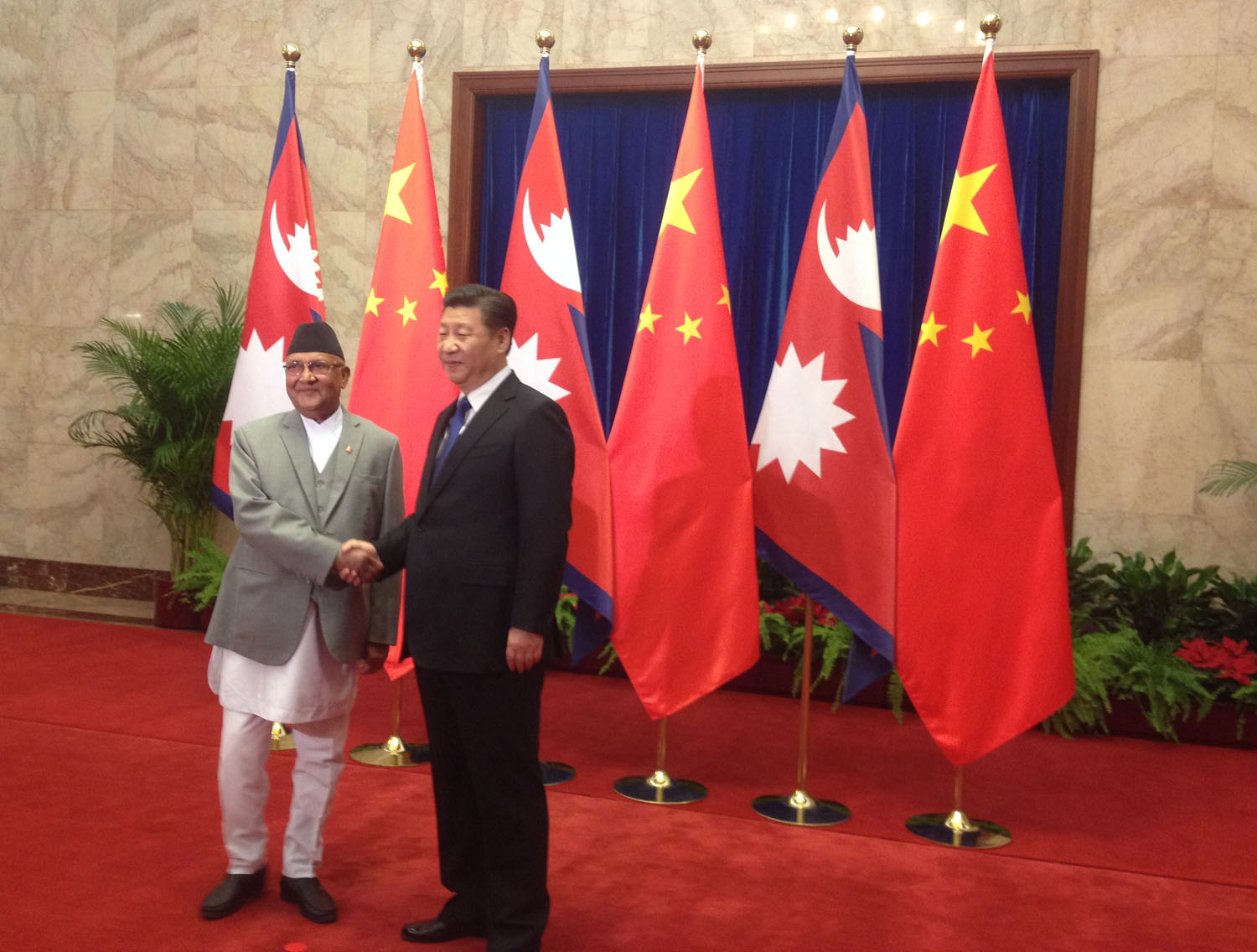Will PM Oli Challenge India’s Monopoly on Trade Routes and Petroleum Supplies in Upcoming China Visit?

Prime Minister KP Sharma Oli’s upcoming visit to China carries high expectations for revisiting the economic agreements established in his previous terms and clarifying Nepal’s stance on China’s Belt and Road Initiative (BRI). During his earlier tenures, Oli's administration sought to diversify Nepal’s trade partners and infrastructure support to reduce dependence on a single neighboring country. However, in doing so, questions about the financial implications of Chinese loans, specifically the risk of falling into a “debt trap,” have stirred debate domestically. As Oli sets out for China once again, his approach to transforming loans into grants, reconsidering BRI projects, and following up on past agreements, especially regarding the import of petroleum products, will be closely observed.
Prime Minister’s Initiative to Convert Debt-Driven Loans into Grants
China’s “debt-trap diplomacy” — a term used to describe instances where infrastructure loans with high interest rates burden the borrowing country with unmanageable debt — has led to caution among several countries involved in the BRI. Nations such as Sri Lanka and Pakistan have struggled to repay their loans, resulting in asset losses or significant compromises in their political autonomy. Recognizing these concerns, PM Oli has been advocating for the conversion of high-interest infrastructure loans into grants or interest-free loans. This initiative aligns with his broader economic vision for Nepal, where he aims to develop infrastructure without risking national sovereignty.
In his past interactions with China, Oli emphasized the importance of minimizing financial risks in major developmental projects. While China has shown some willingness to accommodate Nepal’s requests for better financing terms, actual commitments toward debt reduction remain limited. If successful in negotiating loan conversions, Oli could set a valuable precedent for Nepal, making Chinese investments sustainable for the nation without compromising its long-term financial health.
The Upcoming Visit to China: Expectations and Objectives
Prime Minister Oli’s visit to China comes at a critical juncture as Nepal seeks to balance its regional relations. The key objectives of this trip appear to be twofold: to reassess existing agreements, particularly under the BRI framework, and to pursue more favorable terms on future projects. The Prime Minister is expected to initiate discussions on implementing the projects agreed upon during his previous tenure, such as the Kerung-Kathmandu railway, cross-border power lines, and the diversification of trade routes.
Nepal’s cautious approach to BRI aligns with recent shifts in its regional strategy. The visit also provides an opportunity to explore alternatives within the China-Nepal partnership, ensuring that the country remains financially stable while maintaining a strong diplomatic relationship with China. This nuanced stance indicates that while Nepal values Chinese investment, it seeks to avoid dependencies that could hinder its long-term autonomy.
Another key element of this visit will likely be Nepal’s need for sustainable, affordable energy resources. Oli's government had previously discussed a deal to import petroleum products from China, particularly after the 2015 Indian blockade, which emphasized Nepal’s overreliance on Indian imports. Although this project has stalled, revisiting and possibly finalizing this agreement could reduce Nepal's energy dependency on India, aligning with Oli's policy to foster diversified trade relationships.
Evaluating Nepal’s Position on the BRI
Nepal signed on to China’s BRI in 2017, envisioning it as a platform for accelerated infrastructure development. However, skepticism around the BRI’s debt implications has led to increasing calls for caution. While BRI projects could provide much-needed infrastructure improvements, the financial terms could burden Nepal with repayment challenges. Countries like Sri Lanka, Malaysia, and Pakistan offer cautionary tales, where large infrastructure projects financed by Chinese loans have either led to financial strain or compelled these countries to make concessions.
Recognizing these concerns, PM Oli’s administration has voiced its intention to renegotiate terms on existing BRI projects and avoid taking on new high-interest debt. This approach reflects Nepal’s balanced stance: it values the potential benefits of the BRI but is wary of accruing debts that could threaten economic stability. Many experts suggest that Nepal’s development aspirations could still be met through alternative means, including aid and investment agreements that do not rely heavily on loans. In fact, Nepal can maintain a strong, mutually beneficial relationship with China without fully committing to all BRI projects.
Instead, Nepal could explore a model similar to Bhutan, which has managed to foster economic cooperation with China without entering large-scale loan agreements. With this in mind, Oli is expected to advocate for alternative partnership structures during his visit, seeking collaborations that would support Nepal’s growth without placing it in precarious debt situations.
Revisiting Petroleum Import Agreements
One of the most notable agreements from Oli’s previous tenure involved the import of petroleum products from China. During the 2015 Indian blockade, which highlighted Nepal’s vulnerability to trade disruptions from a single source, Oli’s government signed an MoU with China to explore petroleum supply alternatives. This agreement included provisions for the import of fuel from China as a contingency measure to reduce Nepal’s dependency on Indian oil.
However, progress on this front has been limited, with logistical and infrastructural challenges delaying its implementation. Nepal lacks the necessary pipeline and storage infrastructure to make petroleum imports from China a viable option in the short term. Addressing this bottleneck remains crucial for Nepal to achieve energy security. Oli’s upcoming visit is expected to bring this issue back to the negotiating table, aiming for concrete steps to operationalize petroleum import routes from China. Success in this area would not only enhance Nepal’s energy resilience but also fulfill Oli’s promise of reducing dependency on any single trade partner.
Implementation Challenges and Public Expectations
While PM Oli has succeeded in initiating numerous agreements with China, the actual implementation of these projects remains a significant concern. Projects such as the Kerung-Kathmandu railway and the petroleum import agreement have generated considerable public interest, but delays have dampened enthusiasm. Infrastructure constraints, political shifts, and financial hurdles have all contributed to these delays, leading many to question whether these agreements will come to fruition.
Public sentiment is largely in favor of economic diversification and stronger Nepal-China ties, but there is a growing expectation that these agreements must translate into tangible benefits. The Prime Minister’s efforts to renegotiate terms and seek favorable financing are viewed positively, but the public remains eager to see progress on the ground. Successful implementation would reinforce Oli’s position as a leader committed to Nepal’s economic independence and resilience.
A Balanced Diplomatic Approach for Nepal
As Nepal continues to navigate its relationships with both India and China, the need for a balanced diplomatic strategy becomes increasingly clear. While the BRI offers substantial infrastructure opportunities, Nepal’s experience with previous projects emphasizes the importance of financial prudence. PM Oli’s visit to China presents an opportunity to reinforce Nepal’s stance: that it seeks development partnerships without compromising sovereignty or accumulating unmanageable debt.
This diplomatic balancing act involves leveraging China’s support for economic growth while avoiding over-reliance on debt-driven financing. Nepal’s commitment to strengthening relations with China without fully immersing in the BRI aligns with its long-term interests, allowing it to foster economic resilience and autonomy. As Oli embarks on this crucial diplomatic mission, the country will be watching closely, hopeful that his negotiations will lead to meaningful progress on long-standing agreements and further solidify Nepal’s position as a stable, self-sustaining economy.
In conclusion, Prime Minister Oli’s visit to China holds the promise of recalibrating Nepal’s approach to foreign investment, moving from debt-driven models to sustainable partnerships. By converting loans to grants, diversifying trade relationships, and selectively engaging with BRI projects, Nepal can continue to build robust ties with China while safeguarding its economic sovereignty. The public anticipation surrounding Oli’s visit reflects the desire for practical outcomes, as Nepal strives for a balanced, forward-looking economic strategy.




![From Kathmandu to the World: How Excel Students Are Winning Big [Admission Open]](https://nepalaaja.com/img/70194/medium/excel-college-info-eng-nep-2342.jpg)
